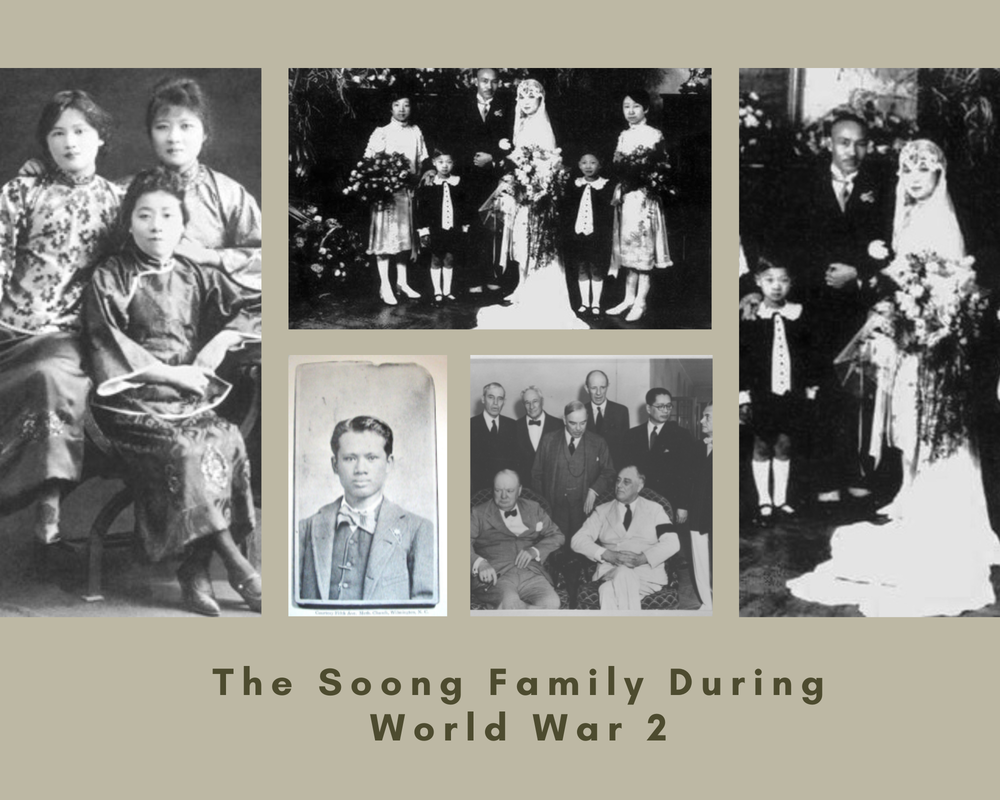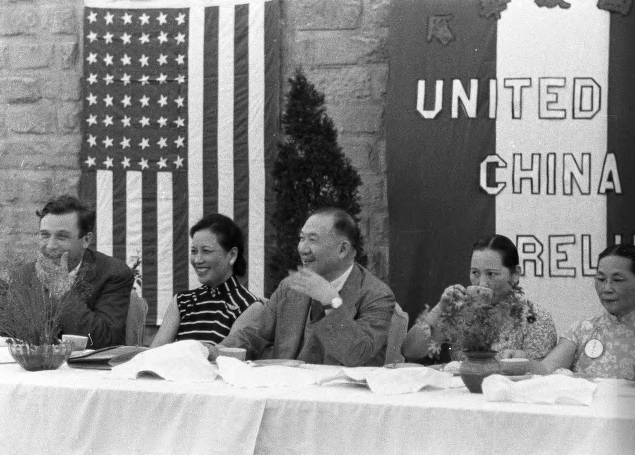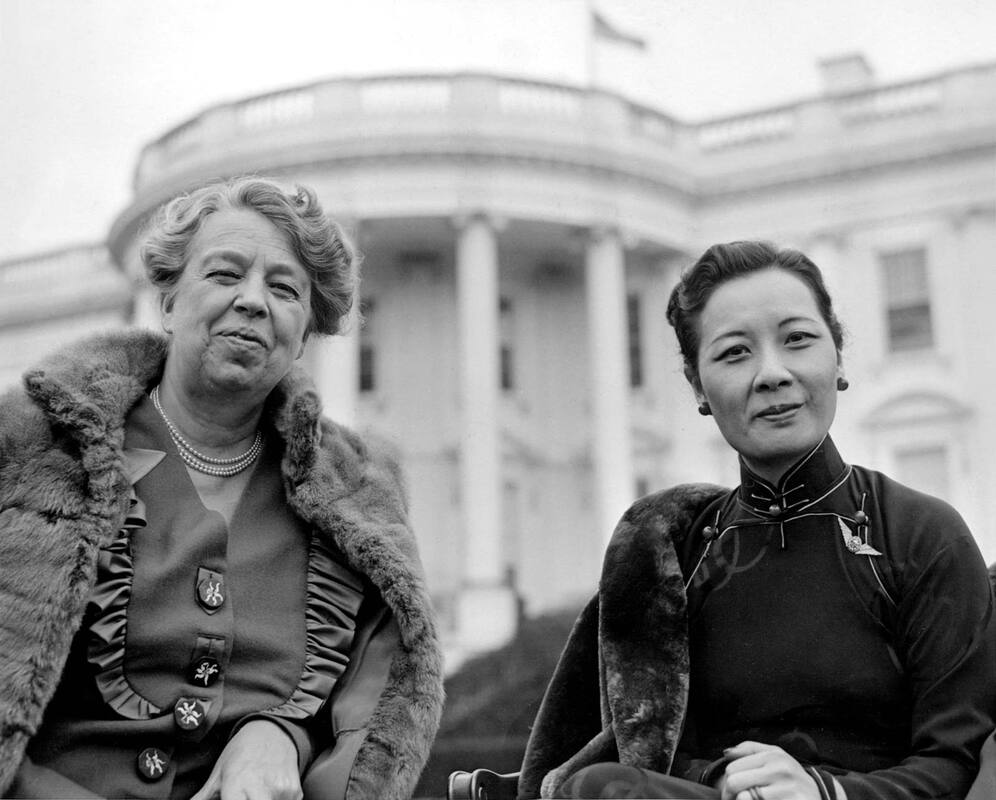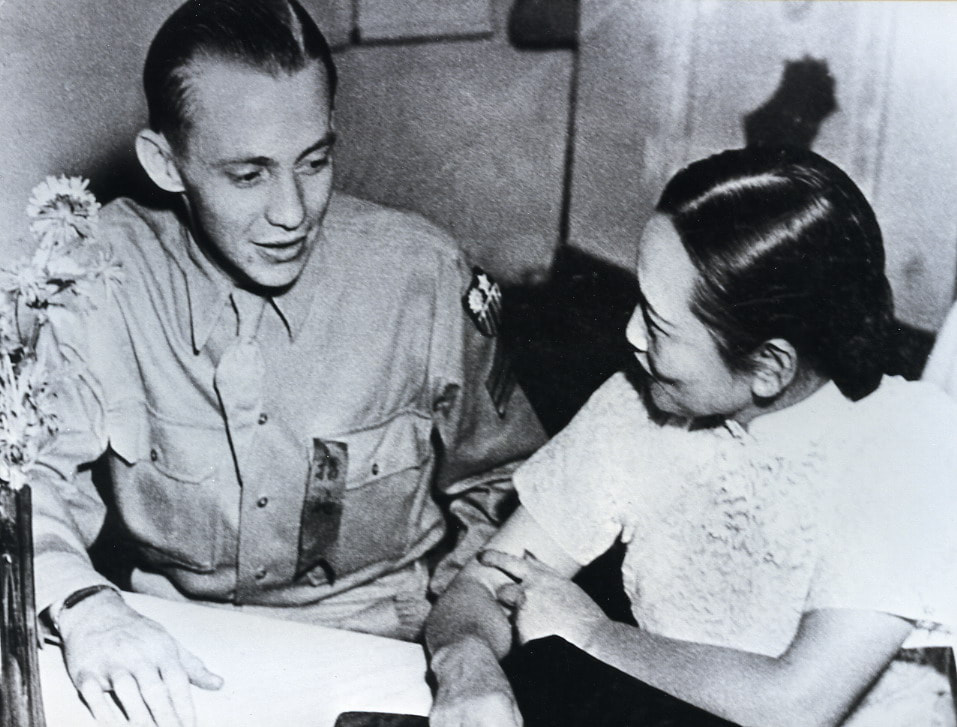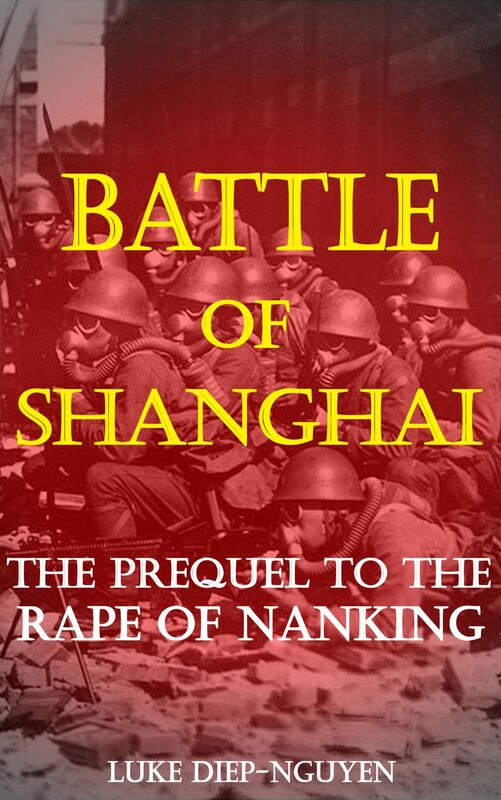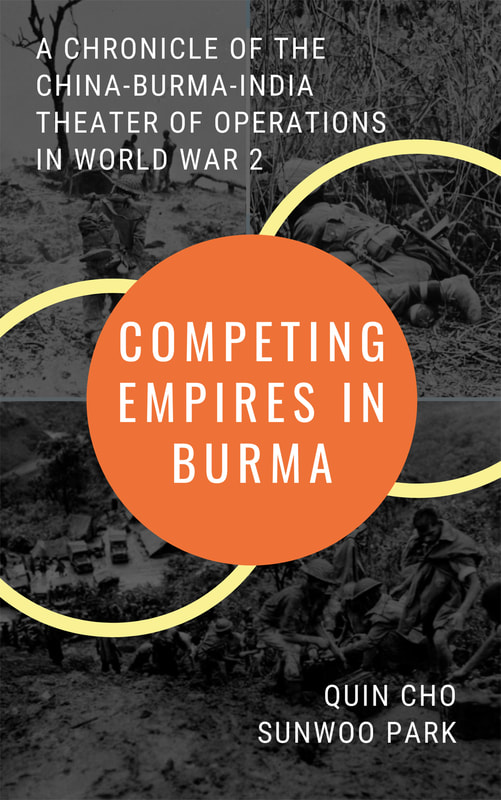|
by Jolin Chan Wealth, power, influence. These words encapsulated the Soong family as they engaged in the politics of an ever-transforming China during the 20th century. While the Japanese invaded, political rifts threatened the country's stability, and the world became enveloped in war; three sisters—Ailing, Chingling, and Meiling—simultaneously represented and reshaped the country. As the daughters of a wealthy family and the wives of prominent leaders, they were in a different kind of frontline during World War II: determining the financial, political, and social situations for hundreds of millions of people. The Soong family story begins with businessman Charlie Soong and "Katherine" Ni Kwei-Tseng, a descendant of a famous Ming Dynasty scholar and minister. They married in 1887 and soon started a family: Soong Ailing, Soong Chingling, Soong T. V., Soong Meiling, Soong T. L., and Soong T. A. The couple strongly valued education, especially for their daughters, which was unorthodox for many traditionally patriarchal families at the time. Nevertheless, Ailing and Chingling attended Wesleyan College, and Mei-ling finished school at Wellesley College (Leong, 108-109). Even before World War II, the Soong family was politically involved. Charlie met Sun Yat-sen in 1894 and became close friends with him, helping him publish revolutionary material (Pakula, 49, 52). When Yuan Shikai became President of the new Republic of China, Soong and his family stayed loyal to Sun, who was living in exile in Japan and moved to Tokyo to help the Kuomintang re-strategize. Ailing had been working as Sun's secretary; a position Chingling would take over. Chingling then married Sun, despite her parents' opposition, and said, "I wanted to help save China, and Dr. Sun was the one man who could do it, so I wanted to help him." (Pakula, 64). Meiling was active as well, having returned from her studies in America. She engaged in Chinese nationalism, reform efforts, and various organizations throughout the late 1910s and 1920s. Life in China, however, changed when Sun Yat-sen died in 1925, leading to political divides and the rise of Chiang Kai-shek (Leong, 114-115). The youngest Soong daughter met Chiang, and the two of them married in 1927, partly for political reasons. As World War II drew closer, their lives became more and more entangled with Chinese politics, especially as they were directly connected to prominent political leaders through marriage. Soong Ailing married Kung Hsiang Hsi, who is a banker and politician. When the Second Sino-Japanese War broke out, she found multiple ways to become involved, from sitting on the Committee of the National Friends of the Wounded Soldiers to working with the National Refugee Children's Association. Ailing, along with her sisters, was particularly involved with the Chinese Industrial Cooperatives, organizations that aimed to gain support and help the Chinese industry (Lee, 477). Her marriage to Kung, who held the positions of Minister of Finance and Premier of the Republic of China, meant that she was closely tied to China's political and economic situation. Despite Ailing's public appearance as a patriotic leader, she and her children were accused of corruption, black marketeering, and using insider information to make investments. Ailing and Kung continued to engage in illegal activities (Lee, 477-478). Along with her family, she moved to America, leaving China behind and creating for herself a wealth that made her one of the richest women as well as one of the most hated in China (Seagrave, 409, 451). For Meiling, the new Madame Chiang, her life naturally was defined by the emerging Second Sino-Japanese War, and she often used her role to garner support against the Japanese. She specifically focused on addressing women and women's organizations. Just before the fall of Beijing, she spoke to Chinese women leaders and emphasized women's critical role in the fight against Japan (Pakula, 274). Though she sought to create an outward image of China as a new modern, and progressive nation, historians argue that the true situation of China did not accurately reflect that. In an interview with Reuters in 1937, she expressed, "Theoretically, women are fighters as much as men and should fight at the front; however, personally, I doubt that the female body's uniqueness can support an intensive fight" (Liu 29-30). Nevertheless, Meiling cultivated an image of being a well-spoken, powerful, and stylish leader. Using her western background, she rose in popularity through her engagement with the United States and especially appealed to American audiences. She made several visits to the United States, hoping to get support for China against the Japanese, and became famous for a speech addressed to Congress. "For have we not on the side of righteousness and justice staunch allies in Great Britain, Russia, and other brave and indomitable peoples?... May I not hope that it is the resolve of Congress to devote itself to the creation of the post-war world? To dedicate itself to the preparation for the brighter future that a stricken world so eagerly awaits?" (Soong, 7) Visiting cities like New York and Los Angeles, Meiling represented China to foreign audiences. She also stayed close by Chiang's side during critical political decisions throughout the war, including the Cairo Conference in 1943 with Chiang, President Roosevelt, and Winston Churchill (Seagrave, 393). The Soong sisters' relationship with each other went through twists and turns. The Soong women, along with their two brothers, created the outward image of a united family. The three sisters occasionally made public appearances together, such as touring hospitals and bombsites, and worked together to help establish the Indusco, an organization to help China's industry during wartime (Lee, 477). They also all lived in Chongqing for a time period during the war. However, family tensions nevertheless rose behind this facade. Ailing's husband, H. H. Kung, often conflicted with her brother T. V. Soong—who in turn did not get along with his other brother-in-law, Chiang (Pakula, 328, 332). Furthermore, Meiling and Ailing supported the Nationalists, while Chingling was once married to Sun Yat-sen and firmly supported his ideas. During the war, Chingling opposed and publicly criticized Chiang and his Nationalist government (Pakula, 322). Chingling also engaged with the war effort by founding the China Defense League, a relief organization that brought supplies to and raised funds for Communist-controlled areas (Pakula, 323). She would become even more politically involved after World War II when the Communists took over China in 1949 and took on the position of Vice Chairmen of the Central People's Government Council (Weisskopf). The members of the Soong family had authority and influence that not only spread throughout China but reached audiences abroad. Together, the Soong sisters made up the most powerful family in China, one with a legacy still remembered today by both admirers and critics. With their background, wealth, and relationships, the Soong sisters had a tremendous influence in the shaping of war-torn and postwar China, which would impact generations to come. Works Cited Forman, Harrison. “Henan Province (China), Wendell Willkie, Madame Chiang Kai-Shek, and H. H. Kung.” University of Wisconsin-Milwaukee Libraries, University of Wisconsin-Milwaukee Libraries, https://collections.lib.uwm.edu/digital/collection/agsphoto/id/11218/rec/4. Accessed 9 July 2022. Kuo, Tai-chun, and Hsiao-ting Lin. T.V. Soong in Modern Chinese History: A Look at His Role in Sino-American Relations in World War II. Hoover Institution Press, 2006, Hoover Institution, https://www.hoover.org/research/tv-soong-modern-chinese-history, Accessed 27 June 2022. Lee, Lily Xiao Hong. Biographical Dictionary of Chinese Women: The Twentieth Century, 1912-2000. Edited by A. D. Stefanowska, vol. 2, Routledge, New York, 2003. Leong, Karen J. "Mayling Soong." The China Mystique: Pearl S. Buck, Anna May Wong, Mayling Soong, and the Transformation of American Orientalism, University of California Press, Berkeley and Los Angeles, CA, 2005, pp. 106–154. Liu, Thea Qianyu. "Swaying Between Grace and Pomposity: The Imagined Modernity of Soong Mayling." Duke University, 2021, https://dukespace.lib.duke.edu/dspace/handle/10161/23333. Accessed 27 June 2022. Pakula, Hannah. The Last Empress: Madame Chiang Kai-Shek and the Birth of Modern China. Simon & Schuster, New York, 2009. Seagrave, Sterling. The Soong Dynasty. HarperCollins, 1985. Soong, Mei-ling, "Addresses To The House Of Representatives And To The Senate." 18 February 1943, Washington D. C. Address. "Soong Meiling with Eleanor Roosevelt." Wellesley College, https://www.wellesley.edu/ealc/alum-corner/chinese-alumnae-corner/soong-mayling-1917-. Accessed 9 July 2022. "Soong Ching-Ling and American Pilot." Wikimedia Commons, 3 June 2010, https://commons.wikimedia.org/wiki/File:Soong_Ching-ling_and_American_pilot.jpg. Accessed 9 July 2022. Weisskopf, Michael. "Soong Ching-Ling, Widow of Sun Yat-Sen, Dies in Peking at Age 90." The Washington Post, 30 May 1980, https://www.washingtonpost.com/archive/local/1981/05/30/soong-ching-ling-widow-of-sun-yat-sen-dies-in-peking-at-age-90/b633dd93-08da-4a66-98e4-71f98819b86e/. Accessed 27 June 2022. For more:
0 Comments
Leave a Reply. |
- Home
- Stories
-
Internship
- Summer 2024 Internship
- Summer 2023 Internship
- Fall 2022 Internship
- Summer 2022 Internship
- Summer 2021 Internship
- Fall 2020- Spring 2021 Internship
- Summer 2020 Internship
- Fall 2019 Internship
- Summer 2019 Internship >
- School Year 2018-2019 Internship
- Summer 2018 Internship >
- Fall 2017 Internship
- Summer 2017 Internship >
- Books
- Archives
-
Resource Page
-
Supplementary Research Guides
>
- Unit 731 - Guide >
-
Philippines' Resistance - Guide
>
- Philippines World War II Timeline
- The Japanese Invasion & Conquest of the Philippines
- Bataan Death March
- Formation of Underground Philippines Resistance
- Supplies of the Guerrilla Fighters
- The Hukbalahap
- Hunter's ROTC
- Marking's Guerrillas
- United States Army Forces in the Philippines of Northern Luzon (USAFIP-NL)
- The Aetas
- Chinese and Filipino-Chinese Nationalist Guerrilla Units
- The Female Faces of the Philippine Guerrillas
- Rising Sun Flag - Guide >
- Pinay Guerrilleras - Guide >
- Fall of Singapore - Guide >
- Three Years and Eight Months - Guide >
- Siamese Sovereignty - Guide >
- The Khabarovsk War Crimes Trial - Guide >
- Unit 731 Cover-up : The Operation Paperclip of the East - Guide >
- Marutas of Unit 731 - Guide >
- Prince Konoe Memoir - Guide >
- Competing Empires in Burma - Guide >
- Battle of Shanghai - Guide >
- Ishi Shiro - Guide >
- Taiwan The Israel of the East - Guide >
- Seeking Justice for Biological Warfare Victims of Unit 731 - Guide >
- Rice and Revolution - Guide >
- Clash of Empires - Guide >
-
Hunger for Power and Self-SufficiencyI - Guide
>
- The Influence of War Rations on Post-War Culinary Transformations
- How World War II Complicated Food Scarcity and Invention
- American Military Innovations
- Government-Sponsored Food Inventions in Europe during World War II
- Feeding the Army: The Adaptation of Japanese Military Cuisine and Its Impact on the Philippines
- Mixed Dishes: Culinary Innovations Driven by Necessity and Food Scarcity
-
Denial A Quick Look of History of Comfort Women and Present Days’ Complication - Guide
>
- The Comfort Women System and the Fight for Recognition
- The Role of Activism and International Pressure
- The Controversy over Japanese History Textbooks
- The Sonyŏsang Statue and the Symbolism of Public Memorials
- Activism and Support from Japanese Citizens
- The Future of Comfort Women Memorials and Education
- Echoes of Empire: The Power of Japanese Propaganda - Guide >
- Lesson Plans >
-
Supplementary Research Guides
>
|
Pacific Atrocities Education
730 Commercial Street San Francisco, CA 94108 415-988-9889 |
Copyright © 2021 Pacific Atrocities Education.
We are a registered 501 (c)(3) charity. |
- Home
- Stories
-
Internship
- Summer 2024 Internship
- Summer 2023 Internship
- Fall 2022 Internship
- Summer 2022 Internship
- Summer 2021 Internship
- Fall 2020- Spring 2021 Internship
- Summer 2020 Internship
- Fall 2019 Internship
- Summer 2019 Internship >
- School Year 2018-2019 Internship
- Summer 2018 Internship >
- Fall 2017 Internship
- Summer 2017 Internship >
- Books
- Archives
-
Resource Page
-
Supplementary Research Guides
>
- Unit 731 - Guide >
-
Philippines' Resistance - Guide
>
- Philippines World War II Timeline
- The Japanese Invasion & Conquest of the Philippines
- Bataan Death March
- Formation of Underground Philippines Resistance
- Supplies of the Guerrilla Fighters
- The Hukbalahap
- Hunter's ROTC
- Marking's Guerrillas
- United States Army Forces in the Philippines of Northern Luzon (USAFIP-NL)
- The Aetas
- Chinese and Filipino-Chinese Nationalist Guerrilla Units
- The Female Faces of the Philippine Guerrillas
- Rising Sun Flag - Guide >
- Pinay Guerrilleras - Guide >
- Fall of Singapore - Guide >
- Three Years and Eight Months - Guide >
- Siamese Sovereignty - Guide >
- The Khabarovsk War Crimes Trial - Guide >
- Unit 731 Cover-up : The Operation Paperclip of the East - Guide >
- Marutas of Unit 731 - Guide >
- Prince Konoe Memoir - Guide >
- Competing Empires in Burma - Guide >
- Battle of Shanghai - Guide >
- Ishi Shiro - Guide >
- Taiwan The Israel of the East - Guide >
- Seeking Justice for Biological Warfare Victims of Unit 731 - Guide >
- Rice and Revolution - Guide >
- Clash of Empires - Guide >
-
Hunger for Power and Self-SufficiencyI - Guide
>
- The Influence of War Rations on Post-War Culinary Transformations
- How World War II Complicated Food Scarcity and Invention
- American Military Innovations
- Government-Sponsored Food Inventions in Europe during World War II
- Feeding the Army: The Adaptation of Japanese Military Cuisine and Its Impact on the Philippines
- Mixed Dishes: Culinary Innovations Driven by Necessity and Food Scarcity
-
Denial A Quick Look of History of Comfort Women and Present Days’ Complication - Guide
>
- The Comfort Women System and the Fight for Recognition
- The Role of Activism and International Pressure
- The Controversy over Japanese History Textbooks
- The Sonyŏsang Statue and the Symbolism of Public Memorials
- Activism and Support from Japanese Citizens
- The Future of Comfort Women Memorials and Education
- Echoes of Empire: The Power of Japanese Propaganda - Guide >
- Lesson Plans >
-
Supplementary Research Guides
>
